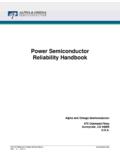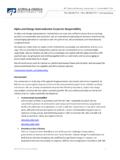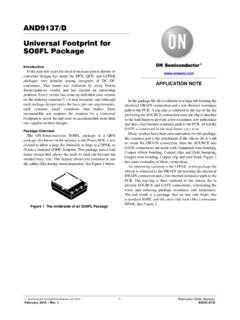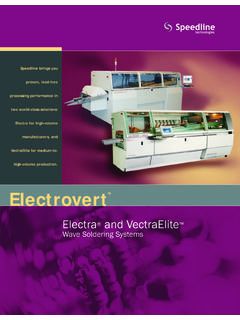Transcription of Alpha & Omega Semiconductor
1 1 Alpha & Omega Semiconductor Reliability Annual Report_2014 Alpha & Omega Semiconductor , Inc 2 Commitment to Excellence at Quality & Reliability To achieve this vision, AOS continuously strive for the excellence in design, manufacturing, reliability and proactively response to the customer s feedback.
2 AOS ensures that all the product quality and reliability exceed the customer s expectation by constantly assessing any potential risk, identifying cause of the suspected failures, driving corrective actions and developing prevention plan within the committed time through the continuously improvement. This AOS product reliability report summarizes AOS Product Reliability result. The published product reliability data combines the results from new product Qualification Test Plan and routine Reliability Monitor Program activities. Accelerated environmental tests are performed on a specific sample size, and then followed by electrical test at end point.
3 The released product will be categorized by the process family and be monitored on a monthly for short term program and quarterly basis for long term program. Table 1 lists the generic reliability qualification requirements and conditions for process / product in plastic package: Table 1: AOS Generic Reliability Qualification Requirements Test Item Test Condition Time Point Sample Size Acc/Reject & LTPD HTGB Temp = Tj, Vgs=100% of Vgsmax 168 / 500 / 1000 hours 77 pcs / lot 0/1 <3% HTRB Temp = Tj, Vds=80% of Vdsmax 168 / 500 / 1000 hours 77 pcs / lot 0/1 <3% Solder reflow precondition 168hrs 85 C/85%RH + 3 cycles reflow@260 C (MSL 1)
4 - The sum of PCT ,TC, HAST and H3 TRB 0/1 <3% HAST 130 C, 85%RH, psia, Vds = 80% of Vdsmax up to 42V 96 hours 77 pcs / lot 0/1, <3% H3 TRB 85 C, 85%RH, Vds = 80% of Vdsmax up to 100V 1000 hours 77 pcs / lot 0/1, <3% Autoclave 121 C, psia, RH=100% 96 hours 77 pcs / lot 0/1, <3% Temperature Cycle -65 to 150 C, air to air 500 cycles 77 pcs / lot 0/1, <3% 3 High Temperature Gate Bias & High Temperature Reverse Bias (HTGB&HTRB) HTGB burn-in stress is used to stress gate oxide at the elevated temperature environment hence any of the gate oxide integrity issue can be identified.
5 HTRB burn-in stress is used to verify junction degradation under the maximum operation temperature. Through HTGB & HTRB B/I stress test, the device lifetime in field operation & long term device level reliability can be determined. FIT rate is calculated by applying the Arrhenius equation with the activation energy of and 60% of upper confidence level of Chi-Square ( 2) distribution at 55 deg C operating conditions. Solder reflow precondition (pre-con) Solder reflow precondition is the test that simulates shipment and storage of package in uncontrollable environment. Precondition is the pre requirement for the mechanical related reliability tests, such as Temperature Cycle, Autoclave and Highly Accelerated Stress TEST (HAST).
6 The routine of the test including parts are soaked in moisture in 85%RH, 85 deg C environment for 168 hrs. Then they will be run through a solder reflow oven 3 times to simulate the SMT stress condition. Temperature Cycling (TC) Temperature cycling test is to evaluate the mechanical integrity of the package and the interaction between the die and the package. This is an air to air test at temperature range from -65 C to 150 C and stress duration is from 250 cycles to 500 cycles, 2~3 cycles per hour. Autoclave (AC) Autoclave test is the test that measures the ability of the device withstand to moisture and contaminant environment.
7 The test is done under enclosed chamber with the condition 121 C, psia, 100%RH and stress duration is 96 hrs. Highly Accelerated Stress Test (HAST) Highly accelerated stress test is to stress the devices under high humidity, high pressure environment under DC bias condition. If ionic contamination involved, the corrosion from metal layer can be accelerated by the HAST stress condition. (H3 TRB is the alternative of HAST) The following tables summarize the qualification results based on the device / process families and the package types, respectively. 4 Summary of AOS Device / Process Qualification Monitor Results To present the actual FIT rate from the different process and device technologies, AOS categorized the device / process family FIT rate by N channel and P channel.
8 Table 2 listed the summary of HTGB and HTRB results. Table 2: Process Equivalent MTTF Sample Size # of failure FIT In hours In Years N channel +10 4255537 198352 0 LV +10 1347371 73150 0 MV +09 897981 42812 0 HV +10 2010185 82390 0 P channel +09 411691 23100 0 LV +09 411691 23100 0 Summary of AOS Package Qualification and Monitor Results Package Name Total stress hours or cycles* AC TC HAST CSP family 44352 231000 44352 DFN2x2 family 66528 346500 66528 DFN2x5 22176 115500 22176 DFN3x3 family 88704 462000 88704 DFN5x6 family 177408 924000 177408 DFN8x8 22176 115500 22176 SO8 66528 346500 66528 SOT23 88704 462000 88704 TO220 133056 693000
9 133056 TO220F 177408 924000 177408 TO247 177408 924000 177408 TO252(DPAK) 88704 462000 88704 TO263(D2 PAK) 66528 346500 66528 TSOP6 22176 115500 22176 *Note: Total stress hours or cycles: sample size x stress time/cycle 5 The presentation of FIT rate for the individual product reliability is restricted by the actual burn-in sample size. Failure Rate Determination is based on JEDEC Standard JESD 85. FIT means one failure per billion hours. Failure Rate = Chi2 x 109 / [2 (N) (H) (Af)] MTTF = 109 / FIT Chi = Chi Squared Distribution, determined by the number of failures and confidence interval N = Total Number of units from burn-in tests H = Duration of burn-in testing Af = Acceleration Factor from Test to Use Conditions (Ea = and Tuse = 55 C) Acceleration Factor [Af] = Exp [Ea / k (1/Tj u 1/Tj s)] Acceleration Factor ratio list.
10 55 deg C 70 deg C 85 deg C 100 deg C 115 deg C 130 deg C 150 deg C Af 259 87 32 13 1 Tj s = Stressed junction temperature in degree (Kelvin), K = C+ Tj u =The use junction temperature in degree (Kelvin), K = C+ k = Boltzmann s constant, X 10-5eV / K











